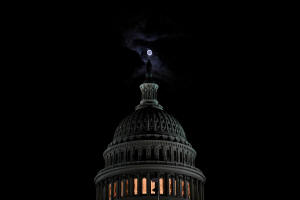US lawmakers dig into partisan corners as debt ceiling default looms
 Send a link to a friend
Send a link to a friend
 [May 02, 2023]
By David Morgan and Richard Cowan [May 02, 2023]
By David Morgan and Richard Cowan
WASHINGTON (Reuters) - U.S. lawmakers responded to news that the federal
government could be unable to pay its bills as soon as June 1 by digging
in on partisan positions, even as Democratic President Joe Biden agreed
to meet with lawmakers on the debt ceiling next week.
Democratic Senate Majority Leader Chuck Schumer on Monday began to clear
the way for a vote for a bill that would suspend the government's $31.4
trillion debt limit for two years without conditions.
Republicans in the Senate and House have said repeatedly that they would
not vote for such a measure, instead lining up behind a bill passed by
the Republican-controlled House of Representatives last week that would
raise the debt limit by $1.5 trillion or until March 31, whichever comes
first, with $4.5 trillion in spending cuts over 10 years.
Biden and Republican House Speaker Kevin McCarthy have not met since
February, with the White House insisting that it would not negotiate on
raising the debt ceiling, a move needed to cover the costs of spending
and tax cuts previously approved by Congress.

U.S. Treasury Secretary Janet Yellen said in a letter to Congress that
the agency may be unable to meet all of its debt obligations as soon as
June 1 if the debt ceiling is not raised, putting new urgency on talks
in Congress.
The potential June 1 deadline was earlier than Treasury's prior June 5
forecast, though it said it was possible that the actual "X-date" would
not come until weeks later than June 1.
"It's about time. I'm glad Biden is finally doing his job," Republican
Senator Rick Scott said on Twitter, after the White House said Biden
would meet with the top two Republicans and Democrats on May 9.
Democrats urged prompt action to raise the limit, necessary to cover the
costs of spending and tax cuts previously agreed to by Congress.
"This is nothing to fool around with. The money has been spent. We do
not want to default. Let's get the debt ceiling taken care of, but let's
talk about how we can reduce the deficit and common sense ways,"
Democratic Senator Jon Tester told reporters. "If we don't get the debt
ceiling, then we go into a depression."
PRIOR RATING CUT
Congress' last long standoff, in 2011 when Democrat Barack Obama was
president and Republicans controlled the House, led to a historic
downgrade of the nation's credit rating, which hammered markets and
raised borrowing costs.
[to top of second column]
|

The moon is seen behind the dome of the
U.S. Capitol building at night in Washington, DC, U.S., February 16,
2022. REUTERS/Jon Cherry

The May 9 date for Biden to meet with McCarthy, Schumer, top Senate
Republican Mitch McConnell and top House Democrat Hakeem Jeffries is
also the next time both chambers of Congress are scheduled to be in
session, after a week-long House recess. In all, Congress is
scheduled to convene for no more than a dozen days before the June 1
deadline.
Some lawmakers said they wished the meeting were sooner.
"I'm happy they're going to sit down and talk. Why not tomorrow and
over the weekend?" Republican Senator Mitt Romney said. "I'm not
going to try and scare anybody. But I'll tell you that as soon as
people start realizing what we're talking about here, I think there
are going be a lot of very upset people."
McConnell told reporters that he had had a "good conversation" with
Biden on Monday, but offered few other details.
Democrats said they could not accept the bill House Republicans
passed last week.
"Republicans' failure to agree to cleanly raise the debt ceiling has
brought the United States to the brink of economic catastrophe,"
said Democratic Senator Sheldon Whitehouse, chair of the Senate
Budget Committee. "Hostage-taking is not the way this country
governs. We must change course, cleanly raise the debt ceiling, and
avert widespread economic pain and instability while we still can."
No. 2 Senate Republican John Thune told reporters that word from the
Treasury Department that the "X-date" beyond which the government
will no longer be able to meet all its obligations could arrive by
June 1 was a wake-up call.

"It reinforces the need for the president to get up here or to get
McCarthy down there to meet with him, one way or the other. I mean,
time is a-wasting."
(Reporting by David Morgan and Richard Cowan in Washington;
Additional reporting by Moira Warburton in Washington; Editing by
Scott Malone and Matthew Lewis)
[© 2023 Thomson Reuters. All rights
reserved.]This material may not be published,
broadcast, rewritten or redistributed.
Thompson Reuters is solely responsible for this content. |